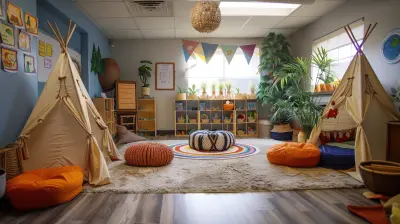26 November 2024
Choosing the right college or university can feel like picking a needle out of a haystack. With thousands of options out there, it's easy to feel overwhelmed. But hey, don’t panic! This decision might seem like the biggest one of your life (and yeah, it’s pretty important), but with the right strategy, you’ll narrow down your options in no time.
Whether you're fresh out of high school or thinking about transferring, this guide will help you make an informed decision. Keep reading, and we’ll walk through everything from academic programs to campus culture. By the end of this article, you'll have a clearer picture of how to choose the right college or university that truly fits you.
Why Choosing the Right College Matters
Before we dive into the nitty-gritty, let’s talk about why this decision is such a big deal. College isn't just about academics; it's about setting the stage for your future. The right institution can open doors to incredible opportunities, introduce you to lifelong friends, and help shape who you are. On the flip side, the wrong choice could mean feeling out of place, struggling academically, or regretting your decision down the road. No pressure, right?But seriously, the more time you invest now in making the right choice, the happier you'll be in the long run. Think of it like planting a tree. You want to pick the right spot, give it the right amount of care, and watch it grow into something amazing.
Step-by-Step Guide to Choosing the Right College or University
1. Identify Your Priorities
First things first: What are you looking for? This is about finding the school that fits your needs, not what others think is best for you. So, grab a pen and paper (or your phone) and jot down your priorities.Here are some questions to ask yourself:
- Are you looking for a large university or a smaller, more intimate college?
- Do you prefer a bustling urban campus or a quiet, rural setting?
- Are specific academic programs or majors a dealbreaker for you?
- Do you want to stay close to home, or are you itching to explore a new city or country?
By understanding what’s important to you, you’ll start narrowing down your options before you even begin researching.
2. Research Academic Programs
This is a biggie. The whole point of college is—surprise, surprise—to get an education. So, you’ll want to choose a school that offers strong programs in your area of interest. Not sure what you want to major in yet? No worries. Look for schools with a wide variety of programs or ones that allow you to explore different fields during your first year or two.Key things to consider:
- Reputation: Is the program highly regarded? Do professors have expertise in their fields?
- Opportunities: Are there internships, research projects, or other hands-on experiences available?
- Flexibility: Are you able to switch majors or double major if you change your mind later on?
3. Evaluate Campus Culture
A good academic fit is crucial, but so is finding a place where you’ll feel comfortable and engaged. College isn’t just about hitting the books; it’s about the experiences you’ll have outside the classroom too. Think about the kind of community you want to be part of.Questions to ponder:
- What are the social dynamics like? Are students more collaborative or competitive?
- Are there clubs, sports teams, or other activities you’re excited about?
- Is the school known for its diversity and inclusivity?
Campus culture can be hard to gauge just by looking at a website, so try to visit campuses if you can. If that’s not possible, look for virtual tours, student blogs, or forums where current students share their experiences.
4. Consider Location and Environment
Location, location, location. It’s not just about whether the campus is pretty (although that doesn’t hurt). Where the school is located can have a big impact on your overall experience.- Urban vs. Rural: Do you want to be in the heart of a city or somewhere quieter? Cities often offer more internships and job opportunities, but rural schools may foster a stronger sense of community.
- Weather: Hate the cold? Then a school in the Northeast might not be for you. Love sunshine? Consider a school in California or Florida.
- Distance from Home: Some people crave independence and want to move across the country, while others prefer staying close to family. Think about how often you’ll want to visit home (and how much you enjoy long plane rides).
5. Check Out Financial Aid and Scholarships
Let’s be real: College is expensive. But don’t let the sticker price scare you away. Many schools offer generous financial aid packages, scholarships, or work-study programs that can make even the most expensive schools affordable.Some things to look at:
- Cost of attendance: This includes tuition, housing, meals, books, and personal expenses.
- Financial aid packages: Some schools are more generous with grants (which you don’t have to pay back) than others.
- Scholarships: Are there merit-based or need-based scholarships you qualify for?
It’s also worth noting that some schools are “need-blind” (they don’t consider your financial need when making admissions decisions) and some are “need-aware” (they do take it into account). Understanding how a school approaches financial aid can help you determine if it’s the right fit for your budget.
6. Look at Graduation and Job Placement Rates
A good college experience is great, but let’s be honest—you’re also going to school to set yourself up for a successful career. Graduation rates and job placement stats can give you a sense of how well the school prepares students for the real world.- Graduation rates: How many students make it to graduation? A low rate could indicate that students struggle to thrive academically or financially.
- Job placement rates: What percentage of graduates find jobs in their field within six months to a year of graduation?
- Alumni network: Does the school have a strong alumni network that could help you land internships or jobs?
7. Visit the Campus (If Possible)
You can read all the brochures and websites in the world, but nothing beats actually stepping foot on campus. If you can, visit the schools on your shortlist. Walk around, talk to students, sit in on a class, and get a feel for the environment.If an in-person visit isn’t an option, don’t worry! Many schools offer virtual tours and online Q&A sessions with current students and staff. Take advantage of these resources to get as much insight as possible.
Common Mistakes to Avoid When Choosing a College or University
1. Going Just for the Name
Yes, prestigious schools have their benefits, but don’t pick a college just because it’s well-known. What’s more important is how well it fits you. A less famous school that offers a strong program in your field and a supportive environment may be a better choice than a top-tier school where you feel lost in the crowd.2. Ignoring Fit for Financial Reasons
On the flip side, don’t automatically write off a school because of the price tag. Many private schools offer financial aid packages that can make them just as affordable—if not more so—than public universities. Always apply and see what the actual cost will be after aid.3. Not Considering Long-Term Goals
It’s easy to get caught up in the excitement of college life, but don’t forget why you’re going in the first place: to prepare for your future. Think about how each school will help you achieve your long-term academic and career goals.
Final Thoughts
At the end of the day, choosing the right college or university is all about finding a place where you can thrive—both academically and personally. It’s about more than just rankings or prestige; it’s about finding a school that aligns with your values, offers the programs you’re passionate about, and provides a community where you’ll feel at home.Remember, this is a big decision, but it’s not the end-all-be-all. There are many paths to success, and choosing a college is just the beginning of your journey. So, take a deep breath, do your research, and trust that you’ll make the right choice for you.












Layne Adams
Choosing the right college is a personal journey; prioritize your values, aspirations, and fit over rankings to find a place that inspires growth.
February 12, 2025 at 12:24 PM